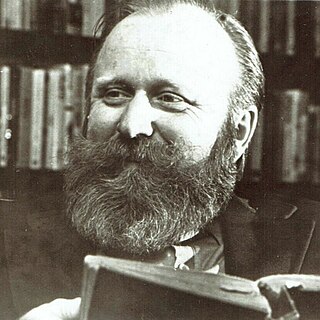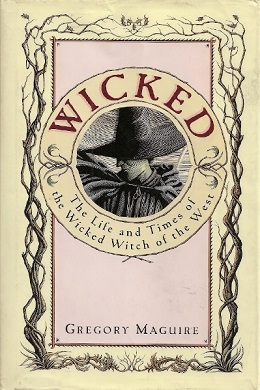
The Booker Prize, formerly the Booker Prize for Fiction (1969–2001) and the Man Booker Prize (2002–2019), is a prestigious literary award conferred each year for the best single work of sustained fiction written in the English language, which was published in the United Kingdom or Ireland. The winner of the Booker Prize receives £50,000, as well as international publicity that usually leads to a significant sales boost. When the prize was created, only novels written by Commonwealth, Irish, and South African citizens were eligible to receive the prize; in 2014, eligibility was widened to any English-language novel—a change that proved controversial.

Franklin Patrick Herbert Jr. was an American science-fiction author, best known for his 1965 novel Dune and its five sequels. He also wrote short stories and worked as a newspaper journalist, photographer, book reviewer, ecological consultant, and lecturer.

Gothic fiction, sometimes called Gothic horror, is a loose literary aesthetic of fear and haunting. The name refers to Gothic architecture of the European Middle Ages, which was characteristic of the settings of early Gothic novels.
Historical fiction is a literary genre in which a fictional plot takes place in the setting of particular real historical events. Although the term is commonly used as a synonym for historical fiction literature, it can also be applied to other types of narrative, including theatre, opera, cinema, and television, as well as video games and graphic novels. It often makes many use of symbolism in allegory using figurative and metaphorical elements to picture a story.

A pen name or nom-de-plume is a pseudonym adopted by an author and printed on the title page or by-line of their works in place of their real name.

Crime fiction, detective story, murder mystery, mystery novel, and police novel are terms used to describe narratives that centre on criminal acts and especially on the investigation, either by an amateur or a professional detective, of a crime, often a murder. Most crime drama focuses on criminal investigation and does not feature the courtroom. Suspense and mystery are key elements that are nearly ubiquitous to the genre.
An autobiographical novel, also known as a autobiographical fiction, fictional autobiography, or autobiographical fiction novel, is a type of novel which uses autofiction techniques, or the merging of autobiographical and fictive elements. The literary technique is distinguished from a typical autobiography or memoir by being a work of fiction presented in the same fashion as a typical non-fiction autobiography by "imitating the conventions of an autobiography."

Roman à clef, French for novel with a key, is a novel about real-life events that is overlaid with a façade of fiction. The fictitious names in the novel represent real people, and the "key" is the relationship between the non-fiction and the fiction. This metaphorical key may be produced separately—typically as an explicit guide to the text by the author—or implied, through the use of epigraphs or other literary techniques.
Dragonlance is a shared universe created by Laura and Tracy Hickman, and expanded by Tracy Hickman and Margaret Weis under the direction of TSR, Inc. into a series of fantasy novels. The Hickmans conceived Dragonlance while driving in their car on the way to TSR for a job interview. Tracy Hickman met his future writing partner Margaret Weis at TSR, and they gathered a group of associates to play the Dungeons & Dragons role-playing game. The adventures during that game inspired a series of gaming modules, a series of novels, licensed products such as board games, and lead miniature figures.

Mystery is a fiction genre where the nature of an event, usually a murder or other crime, remains mysterious until the end of the story. Often within a closed circle of suspects, each suspect is usually provided with a credible motive and a reasonable opportunity for committing the crime. The central character is often a detective, who eventually solves the mystery by logical deduction from facts presented to the reader. Some mystery books are non-fiction. Mystery fiction can be detective stories in which the emphasis is on the puzzle or suspense element and its logical solution such as a whodunit. Mystery fiction can be contrasted with hardboiled detective stories, which focus on action and gritty realism.

Nelle Harper Lee was an American novelist whose 1960 novel To Kill a Mockingbird won the 1961 Pulitzer Prize and became a classic of modern American literature. She assisted her close friend Truman Capote in his research for the book In Cold Blood (1966). Her second and final novel, Go Set a Watchman, was an earlier draft of Mockingbird, set at a later date, that was published in July 2015 as a sequel.

A romance novel or romantic novel is a genre fiction novel that primary focuses on the relationship and romantic love between two people, typically with an emotionally satisfying and optimistic ending. Authors who have contributed to the development of this genre include Maria Edgeworth, Samuel Richardson, Jane Austen, and Charlotte Brontë.

Clive Eric Cussler was an American adventure novelist and underwater explorer. His thriller novels, many featuring the character Dirk Pitt, have been listed on The New York Times fiction best-seller list more than 20 times. Cussler was the founder and chairman of the National Underwater and Marine Agency (NUMA), which has discovered more than 60 shipwreck sites and numerous other notable underwater wrecks. He was the sole author or main author of more than 80 books. He often placed himself into his books as himself.

James Brendan Patterson is an American author. Among his works are the Alex Cross, Michael Bennett, Women's Murder Club, Maximum Ride, Daniel X, NYPD Red, Witch & Wizard, Private and Middle School series, as well as many stand-alone thrillers, non-fiction, and romance novels. Patterson's books have sold more than 425 million copies, and he was the first person to sell one million e-books. In 2016, Patterson topped Forbes's list of highest-paid authors for the third consecutive year, with an income of $95 million. His total income over a decade is estimated at $700 million.

Wicked: The Life and Times of the Wicked Witch of the West is an American novel published in 1995, written by Gregory Maguire with illustrations by Douglas Smith. It is the first in The Wicked Years series, and was followed by Son of a Witch, A Lion Among Men, and Out of Oz.
A light novel is a type of popular literature novel native to Japan, usually classified as young adult fiction, generally targeting teens to twenties. The definition is very vague, and wide-ranging.

In literature, a serial is a printing or publishing format by which a single larger work, often a work of narrative fiction, is published in smaller, sequential instalments. The instalments are also known as numbers, parts, fascicules or fascicles, and may be released either as separate publications or within sequential issues of a periodical publication, such as a magazine or newspaper.
A novel is an extended work of narrative fiction usually written in prose and published as a book. The English word to describe such a work derives from the Italian: novella for "new", "news", or "short story ", itself from the Latin: novella, a singular noun use of the neuter plural of novellus, diminutive of novus, meaning "new". According to Margaret Doody, the novel has "a continuous and comprehensive history of about two thousand years", with its origins in the Ancient Greek and Roman novel, Medieval Chivalric romance, and in the tradition of the Italian Renaissance novella. The ancient romance form was revived by Romanticism, in the historical romances of Walter Scott and the Gothic novel. Some novelists, including Nathaniel Hawthorne, Herman Melville, Ann Radcliffe, and John Cowper Powys, preferred the term "romance". Such "romances" should not be confused with the genre fiction romance novel, which focuses on romantic love. M. H. Abrams and Walter Scott have argued that a novel is a fiction narrative that displays a realistic depiction of the state of a society, while the romance encompasses any fictitious narrative that emphasizes marvellous or uncommon incidents. Works of fiction that include marvellous or uncommon incidents are also novels, including Mary Shelley's Frankenstein, J. R. R. Tolkien's The Lord of the Rings, and Harper Lee's To Kill a Mockingbird.

A debut novel is the first novel a novelist publishes. Debut novels are often the author's first opportunity to make an impact on the publishing industry, and thus the success or failure of a debut novel can affect the ability of the author to publish in the future. First-time novelists without a previous published reputation, such as publication in nonfiction, magazines, or literary journals, typically struggle to find a publisher.

A novelist is an author or writer of novels, though often novelists also write in other genres of both fiction and non-fiction. Some novelists are professional novelists, thus make a living writing novels and other fiction, while others aspire to support themselves in this way or write as an avocation. Most novelists struggle to have their debut novel published, but once published they often continue to be published, although very few become literary celebrities, thus gaining prestige or a considerable income from their work.














